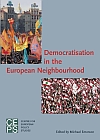Islam, Freedom and Democracy in the Arab World
Islam, Freedom and Democracy in the Arab World
Author(s): Bassam Tibi
Subject(s): Civil Society, Politics and religion, Politics and society
Published by: CEPS Centre for European Policy Studies
Summary/Abstract: It is argued that the developments in the field of democracy in the Arab world have more important implications for Europe than for the US. If democracy is dismissed, it will be impossible for the European Islamic diaspora to integrate. Political freedom in Arab societies will not fall from heaven. Nor will it be presented as a gift by a ruler or be successfully imposed from outside by an external power. History teaches us that people have to fight for their rights and will continue to be subjugated as long as they fail to do so. In this context one needs to ask whether political Islam provides a light at the end of the dark Middle Eastern tunnel. The answer of the present analysis suggests that it does not. Yet the historical experience of introducing democracy to the Arab world has shown that no one can overlook the religion of Islam while talking about democracy in a political sense. The place of Islam has to be restricted, however, to an ethics of democracy and never be extended to a system of government and state. This author cannot detect the spirit and institutions of democracy either in the concept or practice of a Shari’a state. Therefore, the de-politicisation of Islam is an essential part of the needed democratisation of this religion.
Stated in a nutshell, this formula presented by the Islamists of al-Islam huwa al-Hal [Islam is the solution] is to be reversed: political Islam is not the solution! The conclusion is thus twofold – on the one hand, there can be no democracy or democratisation without engaging an Islamic discourse on this issue. On the other hand, an Islamisation of politics in the Arab world is not the right avenue for introducing a civil Islam that is consonant with democracy. To be sure, democracy is a political culture of rule based on pluralism; it is not a valuefree procedure of voting for a political direction that opposes pluralism in a civil society in favour of a religion-based rule under the heading of ‘nizam Islami’ [Islamic system]. This nizam would be no road to democratisation. Arab democracy cannot be a copy of Western democracy. Nevertheless, it could be a variety of the phenomenon of a universal democracy, but never really a rule in its own terms.
Book: Democratisation in the European Neighbourhood
- Page Range: 93-116
- Page Count: 24
- Publication Year: 2005
- Language: English
- Content File-PDF

